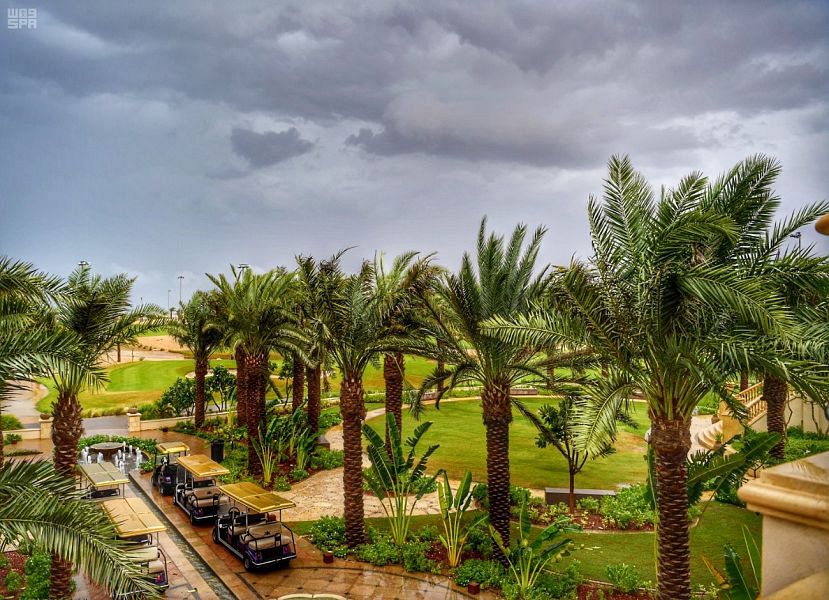
The golfers were happy with $3.5 million in the pot in prize money and the $3.3 million doled out in appearance fees
Saudi Arabia booked its place on the sporting roster — another tick on the Vision 2030 to-do list.
LONDON: As the tidy-up begins after Saudi International, the general verdict seems to be that the Kingdom’s first high-profile golf tournament was a great success on every level.
The golfers were happy with $3.5 million in the pot in prize money and the $3.3 million doled out in appearance fees, simply for turning up.
The spectators were delighted to have the chance to watch some of the biggest names in golf — such as Justin Rose, Brooks Koepka and tournament winner Dustin Johnson — in action.
The media was excited about having a first-time event in a first-time country to talk about. Viewing figures for Sky, which broadcast the tournament, were healthy.
Most importantly, Saudi Arabia booked its place on the sporting roster. Another tick on the Vision 2030 to-do list.
When it comes to branding — be it an item of clothing or an entire country — there are few more powerful tools than sport.
Consider the cities that have bid to host the Olympic Games. Candidates over the past 30 years have included Belgrade (twice), Tashkent, Havana and Baku. The reasons may differ but the aim is the same: Improvement of image and shifting of perceptions.
As the capital of Serbia — perceived as the aggressor in the Balkan conflict of the 1990s — Belgrade had a serious image problem. Havana might want to flaunt its status as the West’s lone bastion of communism but it also needs the hard currency that visitors bring to the country, while Tashkent and Baku — respectively the capitals of Uzbekistan and Azerbaijan — just want to tell people where they are in the hope of kick-starting a lucrative tourism industry.
“High-profile sporting events present an opportunity for the host nation to put their best foot forward and present the best versions of themselves to the rest of the world,” said Declan Aherne, associate director of the business consultancy, Brand Finance.
“It’s an opportunity to welcome fans and media from all across the world and highlight the virtues of local peoples and landscape that play to the strengths of the host nation.”
Sport can also achieve more than skilled diplomacy or marketing, Aherne added.
“There’s no doubt that sports diplomacy has the ability to unite large groups of people. This is particularly true when a national team of a popular sport is facing a rival team or country.
“When local club teams take part in an international tournament — think Champions League football — then that team becomes a representative for a whole nation. Many people’s only perceptions of foreign lands are shaped by the only ambassadors they have access to — sporting teams from their respective countries. In that manner, sport has a big ability to impact the reputation or image of a country.”
As well as demonstrating its growing economic status, the unifying capabilities of sport could be why India — whose religious minorities feel increasingly alienated by the Hindu-led government — is considering bidding for the 2032 Olympics.
Organizing any major sporting is a vastly expensive undertaking. The event generates income but it can also saddle a city or country with debts that take years to pay off. The Montreal Games of 1976 almost bankrupted the city and the iconic Bird’s Nest Stadium built for 2008 Games in Beijing at a cost of $423 million has come nowhere near to paying for itself and still costs $11 million in upkeep.
So, any city considering playing host to a major sports event such as the Olympics or the World Cup must believe it is worth doing.
Dubai was relatively little-known until sport helped to rebrand it as a top destination for tourism, via snooker, darts, tennis and the Race to Dubai, which is now firmly established on the European Tour golfing circuit. The city now regularly features on lists of the most desirable places to live.
By comparison, Abu Dhabi was Dubai’s sleepier, more restrained neighbor until the Grand Prix came to town in 2009 as the 19th and final race of the F1 season, bringing top performing acts in its wake to further tempt visitors.
Baku followed the same pattern with its inaugural Grand Prix in 2016. Despite concerns over Azerbaijan’s human rights record, the Baku race — which boasts the second-longest lap in Formula One — replaced South Korea on the F1 calendar. The following year, 8,000 foreign tourists attended the inaugural Azerbaijan Grand Prix according to figures released in the Azerbaijani media, and in 2018 foreign tourism was up by 6 percent. The state travel agency reported a 35 percent increase in visitors from the Middle East and a whopping 120 percent rise in visitors from Saudi Arabia.
The 2000 Olympics in Sydney brought Australia an economic gain of $4.5 billion dollars. Russia spent an estimated 14 billion on hosting the football World Cup but according to state officials got a $26 billion “uplift” to the national economy, said Aherne.
But the image-polishing doesn’t always work. With a well-deserved reputation for violent crime, the authorities in Rio de Janeiro pledged to make the city safer than it had ever been for the 2016 Olympics.
But despite drafting in 85,000 troops and police, numerous athletes and officials were assaulted, including a man called Felipe Seixas who was robbed at knifepoint as he left the Olympic stadium. He was the chief of security.












